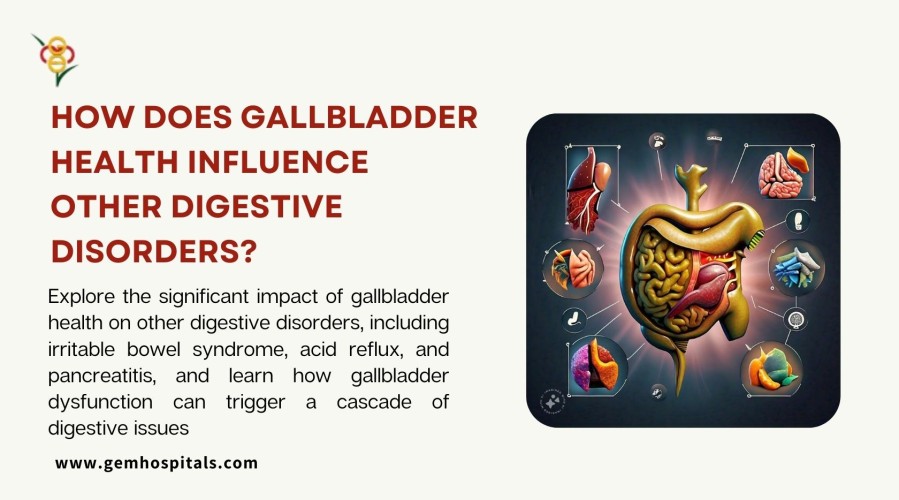Learn what gallstones are, their common symptoms, causes, and treatment options. Discover when to seek medical care and how to manage gallstone complications effectively.
How Does Gallbladder Health Influence Other Digestive Disorders?

The gallbladder, a small organ located beneath the liver, plays a crucial role in digestive health. While it may seem insignificant, the gallbladder's condition can significantly impact other digestive disorders. Understanding this connection can help in managing overall digestive health more effectively. Let's dive into how gallbladder health influences various digestive issues.
The Role of the Gallbladder in Digestion
The gallbladder stores bile, a digestive fluid produced by the liver. Bile aids in breaking down fats into fatty acids, which can be absorbed by the digestive tract. When you eat, the gallbladder releases bile into the small intestine, facilitating fat digestion. Proper bile flow is essential for smooth digestion and nutrient absorption.
Common Gallbladder Problems
- Gallstones: Solid particles that form from bile cholesterol and bilirubin in the gallbladder.
- Cholecystitis: Inflammation of the gallbladder, often due to gallstones blocking the cystic duct.
- Biliary Dyskinesia: A motility disorder affecting the bile ducts, leading to improper bile flow.
- Gallbladder Polyps: Growths on the gallbladder lining, usually benign but sometimes problematic.
How Gallbladder Issues Affect Digestion
Impaired Fat Digestion
When the gallbladder doesn't function correctly, bile release is compromised, leading to difficulties in digesting fats. This can cause symptoms like bloating, diarrhea, and fatty stools.
Gallstones and Other Digestive Disorders
Gallstones can block bile ducts, causing pain and inflammation. This obstruction can lead to serious conditions such as pancreatitis (inflammation of the pancreas) and cholangitis (infection of the bile ducts).
Impact on Gut Health
Poor bile flow can alter gut flora balance, leading to dysbiosis—a condition where harmful bacteria outnumber beneficial ones. Dysbiosis is linked to several digestive disorders, including irritable bowel syndrome (IBS) and small intestinal bacterial overgrowth (SIBO).
Signs Your Gallbladder Might Be Causing Digestive Issues
- Abdominal Pain: Especially in the upper right quadrant or center of the abdomen.
- Nausea and Vomiting: Often after eating fatty meals.
- Chronic Diarrhea: Persistent loose stools could indicate bile acid malabsorption.
- Jaundice: Yellowing of the skin and eyes, indicating a bile duct blockage.
Preventing Gallbladder-Related Digestive Problems
- Healthy Diet: A diet low in refined carbohydrates and high in fiber can help maintain gallbladder health. Include plenty of fruits, vegetables, whole grains, and lean proteins.
- Regular Exercise: Physical activity helps keep the digestive system in good working order.
- Hydration: Drinking plenty of water supports bile production and flow.
- Healthy Weight: Maintain a healthy weight to reduce the risk of gallstones and other gallbladder issues.
When to Seek Medical Help
If you experience symptoms like severe abdominal pain, persistent nausea, vomiting, or jaundice, it's essential to seek medical attention promptly. These could be signs of serious gallbladder problems requiring professional intervention.
Schedule an Appointment at GEM Hospital
For comprehensive evaluation and treatment of gallbladder-related digestive disorders, schedule an appointment with GEM Hospital. Our experienced medical team is dedicated to providing personalized care to help you achieve optimal digestive health. Don't let gallbladder issues disrupt your life—contact us today to take the first step toward better health.
Blogs & Article
Learn about bloating and gas problems, including common causes, symptoms, and effective solutions to improve digestion, reduce discomfort, and maintain gut health.
Learn how unverified Ayurveda treatments may cause liver damage, understand the risks, symptoms, and why medical guidance is essential for safe care.


